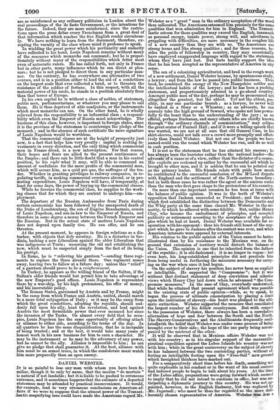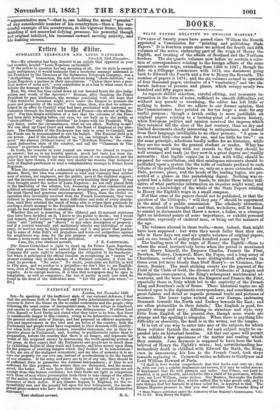DANIEL WEBSTER.
IT is so painful to lose any man with whom you have been fa- miliar, though it be only by name, that the maxim " de mortuis " is natural if not laudable ; but it is liable to be pushed to erroneous extremes, and it sometimes happens that the estimate of a departed statesman may be attended by practical inconvenience. It would, for example, lead to 'very erroneous conclusions on American af- fairs if we were to suppose that the utmost power of the Transat- lantic magnifying lens could have made the Americans regard Mr. Webster as a " great " man in the ordinary acceptation of the word thus collocated. The Americans esteemed him precisely for the smile qualities that won admiration for him in England. The Transat- lantic esteem for those qualities may exceed the English, inasmuch as personal energy, innate power, strong, will, and adroitness in grappling with difficulties, are more necessary in the rougher life of a new country than they are with us. The Americans use strong terms and like strong qualities • and for these reasons, be- sides the pride of fellowship in country, they may occasionally have employed exaggerated language with regard to the statesman whom they have just lost. But facts hardly support the idea that he has been accepted as the representative of America in any sense.
The son of a colonizing agriculturist, and bred in the rough work of a new settlement, Daniel Webster became, by spontaneous study, a lawyer; and from the law he passed into public business. Thus bred, he combined the energy of the New Hampshire settler and the intellectual habits of the lawyer, and he has been a pushing statesman, and proportionately admired in a go-ahead country. Amongst publics men of the day, perhaps he may be pronounced not altogether the greatest, but the ablest. Yet not the ablest,•pos. sibly, in any one particular branch ; as a lawyer, he never will be ranked as a Story or a Wheaton ; as an advocate, he can scarcely take the high. ground of Seward, who spoke not less power- fully to the heart than to the understanding of 'thejury ; as an official, perhaps Buchanan, and many others who are chiefly known through "the ordinary channels of communication," may eclipse the great orator of Fennell Hall ; and if it were a telling speeoh that was wanted, we are not at all sure that old General Cass, in his shirt-sleeves, could not talk over a crowd more promptly and effect- ively than Daniel -Webster. But not one of the people we have named could rim the round which Webster has run, and do so well in each position. It is not as the statesman that he has attained his success; he has always been the barrister rather than the national leader—the advocate Of a cause or of a view, rather than the dictator of a course. -His exploits are reckoned up rather by the successful aid which he brought to other men, and it is seldom that he can be pointed out as the primary leader. His friends relate with pride how much he contributed to the successful conclusion of the M'Leod dispute with England and the settlement of the North-eastern boundary; 'but in. both these eases he was rather-the agent or the amicus curse than the man who firstgave shape 'to the pretensions of his counttrryy. On more than one important occasion he has been at issue with the balance of public opinion. It was in the teeth of Webster's opposition that Jackson succeeded as President; and the contest which first established the distinction between the Democratie and the Whig party at the same time classed 'Mr. Webster in-the Mi. n.ority, to which he adhered with some fidelity. 'But, unlike Henry Clay, who became the embodiment of principles, and accepted publicity or retirement according to the acceptance of the princi- ples which he had at heart, Daniel Webster was available for co- operation with his opponent : thus his friends still boast of the sup- port which he gave to Jackson after the contest was over, and when American interests were opposed by external interests. :His relation to the.public opinion of the Union cannot-be better illustrated than by his resistance to the -Mexican war, on the ground that extension of territory would disturb the bsiamte of the Union. The opinion is one that he inherited from the fathers of the republic ; it is old-fashioned ; it is no longer in vogue : but even here, his long-established principles did not preclude him from being useful in furthering the measures necessary for carry- ing on the war when once it had begun. On the subject of slavery his :position has. never been so explicit or intelligible. lie supported the " Compromise " ; but it was without that distinct statement of deep conviction and ulterior views which Henry Clay laid down when he advanced " the Coin- :promise measures.' In the case of Clay, everybody understood, that while 'he attained that present agreement which was possible in the existing state of public opinion—while, so to speak, he began the process of ultimate emancipation by placing a -limit upon the institution of slavery—his heart was pledged to the ulti- mate extinction. Webster supported the measure that conciliated the largest number of his fellow countrymen. But with respect to the .possession of Webster, there always has been a correlative alternation of hope and fear between the South and the North. The Slavery-Conservatives and the Abolitionists frequently oscil- late:With the belief that Webster was under some process of being brought.over to their side ; the hope of the one party being accom- panied by the mistrust of the other.
It will be observed that in Mexican affairs Webster was not with his country ; as in his singular support of the mercantile- piratical expedition against the Lobos Islands his country was not with him; in the great controversy on the subject of slavery he has baanced between the two contending parties, without ef- fecting an intelligible footing upon the "free-Soil" _new ground which farsighted thinkers have marked out.
For a comparatively short time before his death, something not quite explicable in his conduct or in the want of his usual success had induced people to begin to talk about his years. At the time of the Lobos affair, preparations were going forward which seemed to imply that he did not intend to continue in office, but was an- ticipating a diplomatic journey to this country. He was not ap- pointed, however, to the English Embassy, but was replaced by Mr. Ingersoll ; who must be thus far regarded as the more deli- berately chosen representative of America. Webster was less a s‘ representative man "—that is, one holding the moral "proxies " of any considerable number of his countrymen—than a fine sue- cessful example of his countrymen, in his vigorous frame, his com- manding if not somewhat defying presence, his powerful though not original intellect, his incessant onward moving activity, and his dashing success.



























 Previous page
Previous page